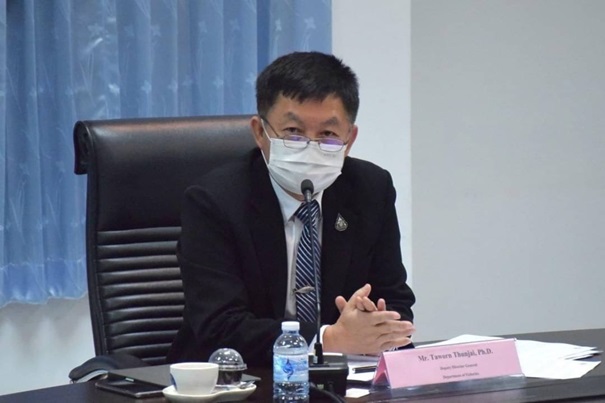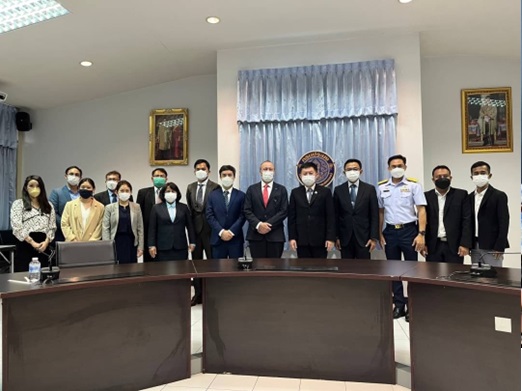Thailand’s implementation of Combating Illegal, Unreported, and Unregulated Fishing (IUU Fishing) in compliance with the EJF's ten principles for global transparency in the fishing and seafood industry




Thailand’s implementation of Combating Illegal, Unreported, and Unregulated Fishing (IUU Fishing) in compliance with the EJF's ten principles for global transparency in the fishing and seafood industry
In summary, Thailand has tackled IUU fishing in accordance with the EJF’s ten principles for global transparency in the fishing and seafood industry, and has been committed in doing so continuously by putting the following measures in place:
1. Vessel Monitoring System (VMS) (Item 2: Public Disclosure of VMS data), the Department of Fisheries is pleased to provide VMS data to the enforcement authorities in accordance with the law prescribed, and if Thailand is a member of the Regional Fisheries Management Organization (RFMOs), VMS data of Thai-flagged fishing vessels/overseas transshipment vessels will be provided upon request of RFMOs.
2. Issuance of fishing licenses (Item 3: Disclosure of fishing licenses) The Department of Fisheries bases its decision on the issuance of fishing licenses and the control of fishing days on scientific data derived from the calculation of the MSY.
3. Disclosure of information (Item 3: Disclosure of the list of authorized fishing vessels) The list of authorized fishing vessels are available on the website of the Department of Fisheries. The Thai flagged fishing vessels and overseas transshipment vessels are listed in the related RFMOs authorized vessel system.
4. Disclosure and publication of cases of penalties for illegal fishing (Item 4: Disclosure and publication of cases of penalties for illegal fishing) The Department of Fisheries publishes the list of fishing vessels used for illegal fishing that has been notified as IUU fishing on its website.
5. Transshipment control measure (Item 5: Transshipment of aquatic animals from one fishing vessel to another vessel is prohibited except under close monitoring) The control measure was developed by the Department of Fisheries utilizing an electronic system that allows historical data to be traced at any time. In addition, according to the law, fishing vessels operating in domestic waters must return to shore within 30 days.
6. Development of a digital database for fishing vessel information (Item 6: Development of fishing vessel digital database) The databases related to the fisheries sector such as vessel registration and fishing license database (e-License), Seabook database, Fishing Info, and Thai Flagged Catch Certification System were developed by the Department of Fisheries.
7. Flags of convenience (Item 7: Flags of convenience are prohibited) The Department of Fisheries has established a strict inspection measure in the event that fishing vessels flying flags of convenience apply to enter the Kingdom (i.e. Panama, Liberia, Somalia, Djibouti, Cameroon), Bangladesh, the Marshall Islands, Singapore, and Hong Kong)
8. Disclosure of fishing vessel owner and beneficiary in fishing (Item 8: Disclosure of fishing vessel owner and beneficiary in fishing) As specified by the Ministerial Regulations on the Issuance of Commercial Fishing Licenses and of Overseas Fishing Licenses, the license applicants must declare their ownership of vessels, both Thai and non-Thai, and provide proof of their ownership of the vessel to the Department of Fisheries.
9. Legal framework (Item 9: Imposition of penalties on persons engaged in IUU fishing), both inside and outside Thai waters, whether they are Thai or non-Thai fishing vessels or stateless vessels, as prescribed by the Royal Ordinance on Fisheries.
10. Use of international standards for the standardization of fishing vessels and trade in fishery products (Item 10: Use of international standards for the standardization of fishing vessels and trade in fishery products) such as the Port State Measures Agreement and the Work in Fishing Convention, etc.
In summary, Thailand has tackled IUU fishing in accordance with the EJF's ten principles for global transparency in the fishing and seafood industry, and has been committed in doing so continuousely putting the following measures in place:

